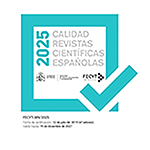Paradoxes of Emancipation
Abstract
This paper relates the concepts of servitude, censorship and emancipation, the point of contact between them being the idea of the necessary consent of the subject and his paradoxical wish not to be free. Étienne de la Boétie, in the middle of the sixteenth century, called it “voluntary servitude”, and claimed that the master’s supremacy does not lie in his power, but in the legitimacy conferred on it by the consent of the servant. During the seventeenth century, the censorship of the Holy Office took the place of the master and regulated free thought and the editing of books. Baltasar Gracián was one writer who confronted this difficulty with ingenuity. A century later, the ideal of emancipation reverts to Étienne de La Boétie’s proposal in the sense of pointing out that the cause of not abandoning the old doctrinal tutelage does not ascribe to an external reality. One response to this paradox was the collective project of the Encyclopédie, led by Denis Diderot.Downloads
##submission.format##
Licenza
La revista Res Publica. Revista de Historia de las Ideas Políticas, para fomentar el intercambio global del conocimiento, facilita el acceso sin restricciones a sus contenidos desde el momento de su publicación en la presente edición electrónica, y por eso es una revista de acceso abierto. Los originales publicados en esta revista son propiedad de la Universidad Complutense de Madrid y es obligatorio citar su procedencia en cualquier reproducción total o parcial. Todos los contenidos se distribuyen bajo una licencia de uso y distribución Creative Commons Reconocimiento 4.0 (CC BY 4.0). Esta circunstancia ha de hacerse constar expresamente de esta forma cuando sea necesario. Puede consultar la versión informativa y el texto legal de la licencia.









